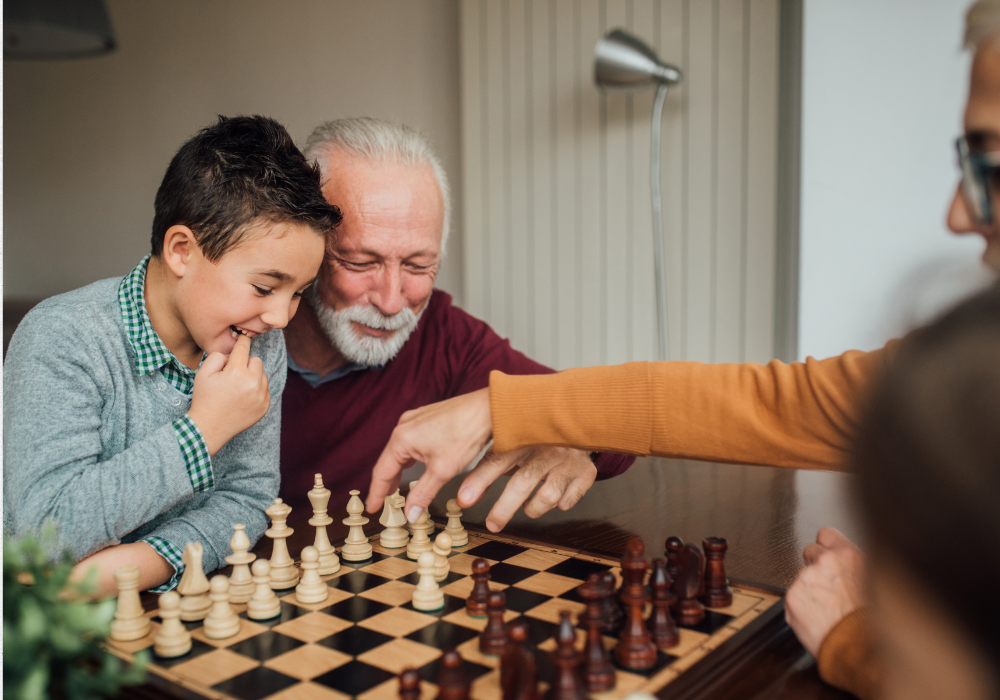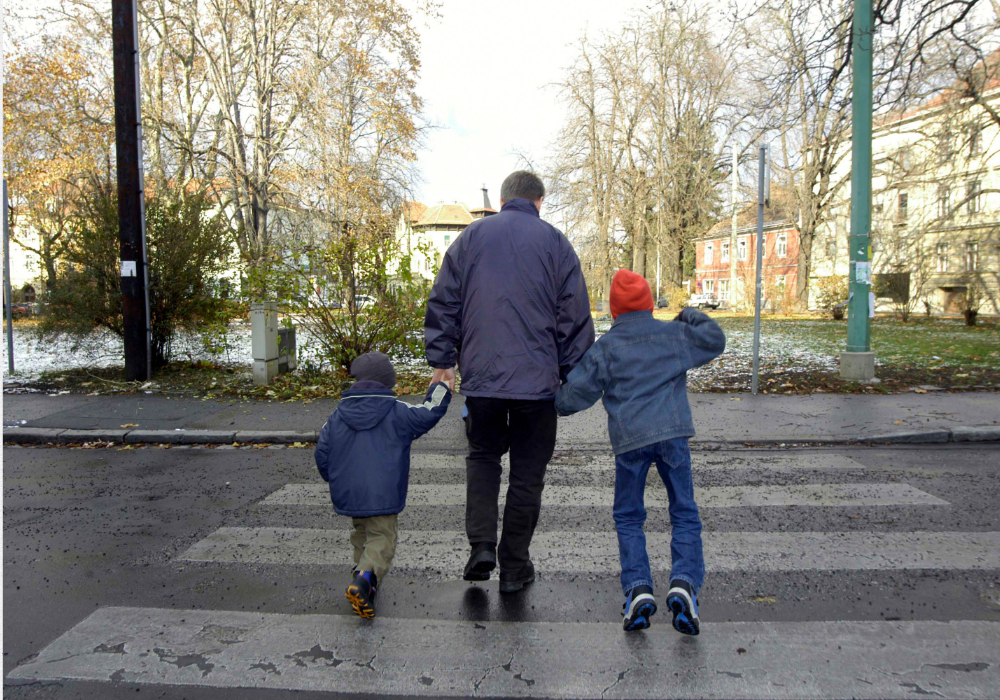Those old kitchen-table talks were the real life lessons.

Some of the best life advice didn’t come from a self-help book or a viral post. It came from a grandparent, standing at the stove, fixing something with duct tape, or handing you a dollar bill with a wink. They didn’t sit you down and say, “Here’s how life works.” They just lived it—out loud, unapologetically, and in a way that stuck with you even if you didn’t realize it at the time. The lessons were woven into casual conversations, quiet moments, and well-worn routines that felt ordinary back then but feel like gold now.
They weren’t trying to impress anyone. They weren’t chasing trends. They were just being themselves—honest, practical, a little stubborn, and deeply loving. And in the process, they handed down more wisdom than they probably ever knew. Here’s what they left behind—and why it still matters.
1. Saying less usually means more.

Grandparents had a gift for silence. Not the awkward kind, but the meaningful kind. They knew how to sit with you in a moment, to let things breathe without rushing in to fill the space. They weren’t always the ones to jump into a deep conversation or offer emotional commentary—but when they did speak, it counted.
They didn’t ramble. They didn’t overshare. They just trusted that sometimes, being there mattered more than saying the right thing. As Dr. Ken Canfield for Grandkids Matter notes, active listening—marked by thoughtful pauses and minimal interruptions—fosters deeper understanding and strengthens relationships.
And when they did offer advice, it was straight to the point, no fluff, and usually exactly what needed to be said. There’s something powerful about people who choose their words carefully—and who know that being present often speaks louder than any pep talk ever could.
2. Hard work wasn’t a motto—it was the daily plan.

For Grandma and Grandpa, hard work wasn’t inspirational—it was just life. They didn’t complain about early mornings or sore backs. They just showed up, day after day, and did what needed to be done. Whether it was running a business, raising kids, or keeping a household afloat with nothing but resourcefulness and elbow grease, they put in the effort without asking for applause.
They weren’t trying to be role models—they just were. Watching them hustle taught you more about responsibility than any chore chart ever could. They made it clear that discipline wasn’t about perfection; it was about showing up even when you didn’t feel like it. They didn’t talk about “grind culture” or “productivity hacks”—they just worked, quietly and consistently. According to Sunlight Senior Care, children with strong relationships with their grandparents often have higher academic success and improved emotional well-being.
3. If something breaks, you fix it—or you find a way.

Grandparents didn’t toss things just because they were a little cracked. Whether it was a chair, a radio, or a relationship, they believed in patching things up before throwing them out. You’d watch them at the kitchen table, tools spread out, determined to make something whole again.
It wasn’t about being frugal—it was about believing things were worth the effort. Per Kyle Weins for iFixit, grandparents often impart lessons about the value of repairing possessions and practicing sustainability, teaching younger generations to fix rather than replace.
They didn’t assume broken meant finished. They figured things out with grit and patience, not replacement parts. Watching them taught a quiet kind of resilience. Not flashy. Not dramatic. Just deeply rooted in the belief that most things—including people—can be saved with a little time, care, and willingness.
4. Pride has its place, but humility gets you further.

Grandparents didn’t strut. They didn’t show off or brag about their successes. In fact, most of the impressive things they did? You probably found out later, in passing, like it wasn’t a big deal. They carried themselves with quiet confidence and let their actions speak for them. There was no need to announce their wins because they were too busy living them.
They taught you that humility isn’t about thinking less of yourself—it’s about not needing to be the center of every story. It’s about sharing credit, lifting others, and staying grounded. Pride might get attention, but humility earns respect. And somehow, the people who say the least about their own greatness are often the ones you admire most. Grandma and Grandpa understood that better than anyone.
5. Food wasn’t just a meal—it was a message.

Grandparents didn’t need a special occasion to make something from scratch. A full meal would appear like magic, no recipe in sight, and always with enough to feed three extra people—just in case. Their cooking wasn’t about perfection or presentation. It was about care, comfort, and making sure you left the table full in every way that mattered.
You could taste love in every bite. A pot of soup could mean “I forgive you.” A slice of pie might mean “I’m proud of you.” Food wasn’t just sustenance—it was connection. They didn’t need to say much; they just slid a plate in front of you and let it speak for them. Looking back, some of your clearest memories aren’t conversations—they’re meals. And some of the most important things you were ever told came with a side of mashed potatoes.
6. Time together mattered more than anything you were doing.

You could be sitting on the porch doing absolutely nothing—and somehow, it still felt like a moment. Grandparents didn’t overbook their time or treat presence like a chore. They gave it freely. They’d let you ramble, read, nap, or just sit in silence next to them—and never once made it feel like you had to earn it.
That kind of presence hits different now. No phone in hand. No multitasking. Just real, quiet time. They didn’t need to entertain you to connect with you. They made you feel like being around you was enough. In a world where attention is constantly divided, remembering what it felt like to be fully seen—without a performance—feels like one of the most important lessons of all.
7. Money wasn’t everything, but it meant something.

Grandparents had a different relationship with money. They respected it. Stretched it. Saved it in places you wouldn’t expect—cookie tins, envelopes, under the mattress. They weren’t flashy about what they had, and they didn’t waste what they didn’t. They knew the value of a dollar because they knew what it took to earn one.
They didn’t talk about investments or financial literacy, but they lived it. They reused things. Repaired things. Waited for sales. And when they did spend, it was thoughtful—on people, not possessions. A few dollars slipped into your hand “just because” could mean more than a hundred from someone else. Their example wasn’t about wealth—it was about worth. And even if they didn’t say it outright, you learned pretty quickly: being smart with money wasn’t about being rich. It was about being ready.
8. Good manners weren’t optional—they were foundational.

“Please” and “thank you” weren’t just words in your grandparents’ house—they were law. You didn’t interrupt. You wrote thank-you notes. You looked people in the eye. It wasn’t about being fancy or old-fashioned—it was about respect. And not just for others—for yourself, too. The way you carried yourself mattered. The way you treated people mattered more.
They didn’t teach manners to impress strangers. They taught them to raise good humans. It wasn’t performative—it was principle. And it had staying power. Those little habits you picked up—holding the door, addressing someone properly, offering your seat—still follow you. They created a quiet kind of dignity. One that doesn’t shout or demand attention, but that everyone notices. In a world where basic decency sometimes feels rare, those small acts of grace still say everything.
9. Laughter really was the best medicine.

Grandparents knew how to laugh—loud, full-body, face-crinkling laughter that made the room lighter. They weren’t trying to be comedians. They were just funny in that effortless, matter-of-fact way. Their humor was dry, practical, often unintentional—but it always landed. And even when life was hard, they still found a way to crack a joke, lift a mood, or remind you not to take things too seriously.
That kind of humor stays with you. It was comforting, unpolished, and completely disarming. Even when they teased, it was with warmth. Their laughter reminded you that joy didn’t have to be perfect or planned. It just had to be shared. In their world, if you could laugh together, you were already doing okay. And when things felt too heavy, they always seemed to have a story, a line, or a perfectly timed eye-roll that made it all feel a little more survivable.
10. Faith didn’t have to be loud to be strong.

For a lot of grandparents, faith wasn’t something they preached—it was something they lived. Maybe it was church every Sunday. Maybe it was a quiet prayer before meals. Maybe it was just the way they carried themselves—with a sense of peace that didn’t come from the world. They didn’t need to explain it. You could feel it in the way they faced loss, loved people, and got up every morning ready to try again.
Their beliefs weren’t flashy. They didn’t post about them. They didn’t debate them. They just let them show up in everything they did. And whether you shared their faith or not, the steadiness it gave them made an impact. It was less about the words and more about the way they lived them. You didn’t need to ask what they believed. You could see it in their kindness, their consistency, and their unshakable calm.
11. Love wasn’t a performance—it was how they showed up.

Grandparents had a different kind of love. It wasn’t flashy or filtered. It was steady, everyday, show-up-with-a-casserole kind of love. It was calling just to check in. Folding your laundry when you didn’t ask. Making your favorite dessert because they remembered. They didn’t always say “I love you” out loud—but they lived it so loudly you never had to wonder.
Their version of love didn’t come with conditions or theatrics. It came with presence. With remembering the little things. With making you feel like you were worth the effort, every single time. And years later, those simple acts of care still sit with you. They shaped your idea of love—what it feels like, what it looks like, what it does. Because in the end, that’s the biggest truth they ever left behind: love doesn’t need to be loud to last forever.
